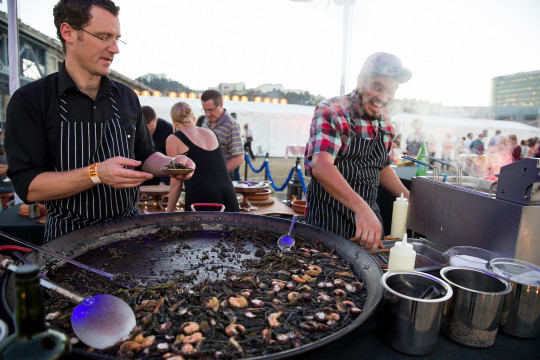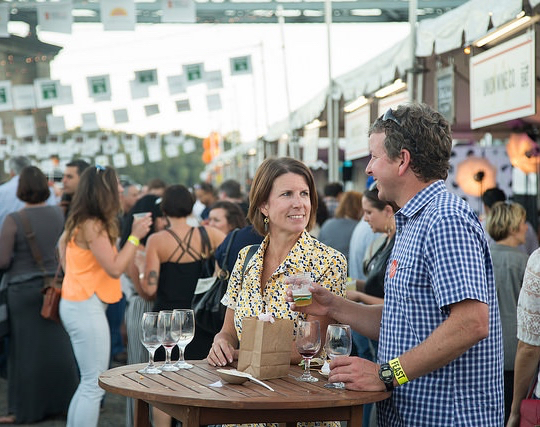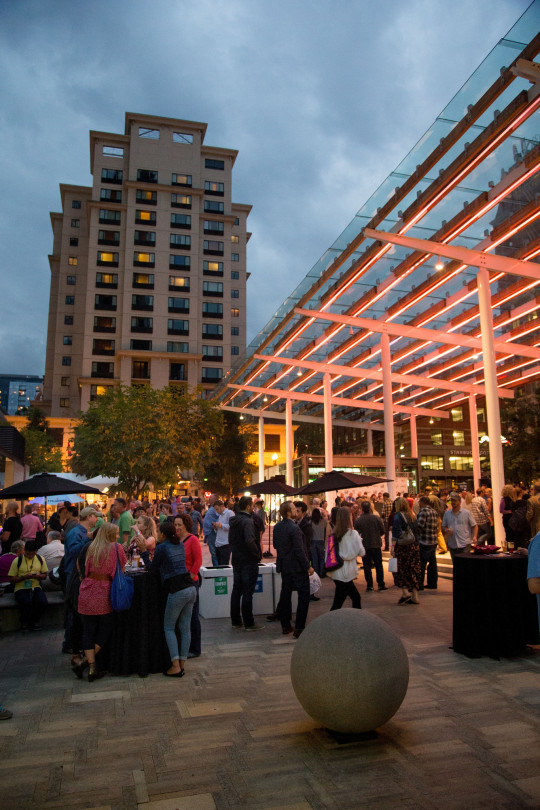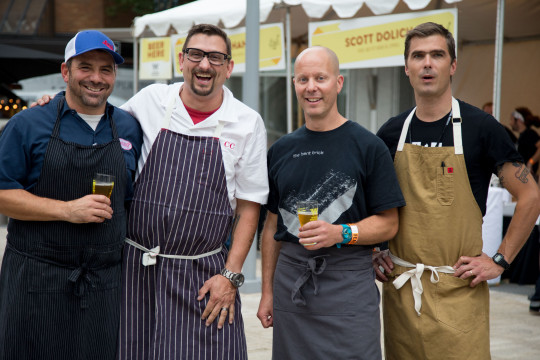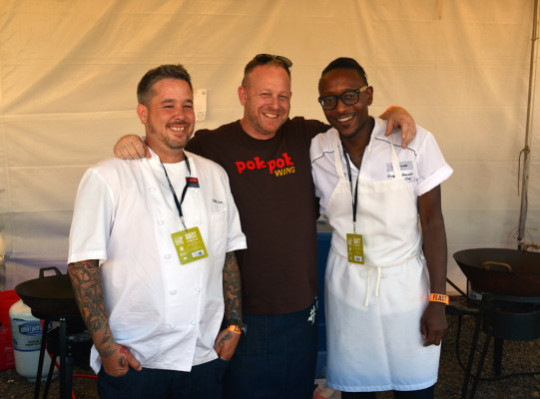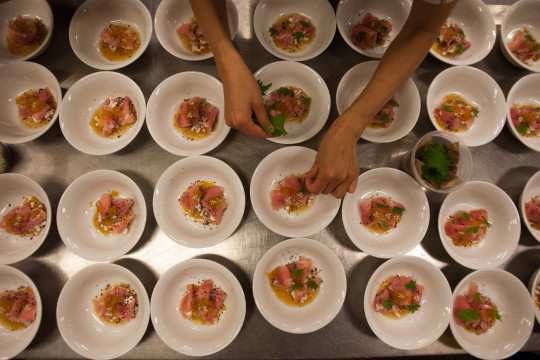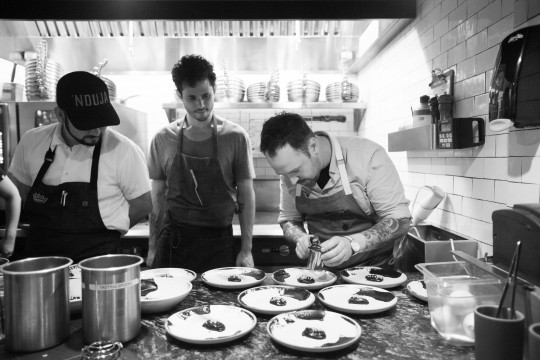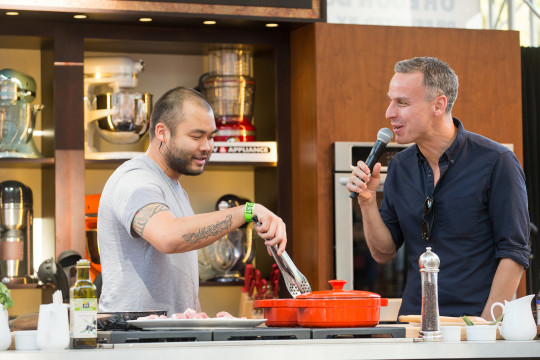Photography Courtesy of FEAST Portland.
Mike Thelin is the Co-Founder of FEAST Portland and principal of Bolted Services, where he consults for food and tourism-related promotions, projects, events and initiatives nationally. He also appears on the popular Cooking Channel show Unique Eats.
Can you tell us a little bit about where you grew up and how you got interested in food?
I grew up in Scappoose, Oregon, which is a suburb to a suburb to a suburb, a tiny town in rural Oregon, 30 minutes, but literally 20 years outside Portland. Very rural community, country music, the word hay is a verb. It’s not what you think of Oregon, but most of Oregon is like that. My family was really multi-ethnic. My dad had 4 daughters from his first wife that were older. One married a Mexican guy, one a Japanese, and my sister Carol’s daughter married a guy from Vietnam. So our normal family get-togethers featured whole roasted goats with the heads on and really smelly condiments. The first time you smell fish sauce, you think it’s disgusting and then you taste it and say, “Where have you been all my life?”
Tacos, sushi, spaetzle. My family just really loved food. People think suburban America doesn’t have a lot of food culture, but I think that is just not how I grew up. It was always a part of life, there was no ‘aha moment’.
Career-wise, what was your first foray into the food world?
I worked in restaurants in my 20s and got a degree in journalism. I tried to do office jobs, but wasn’t good at it. I was so bored, but loved to be around food people, because they were much cooler, in general!” (laughs) I kept going back to restaurants, but I was also interested in business and liked making things happen. I didn’t really figure out how to reconcile those two, but almost 10 years ago, I quit my job and sold my house and moved to Spain for a year. And then when I came back, I knew I had to do something that was in line with my passions. I dedicated myself to food writing and became the food critic for a local paper, Willamette Week in Portland. Then pretty soon there after, I started consulting on events as a way to do something else I liked. I had the aptitude for the events side and really understood how to make them work and how to not bleed money. How to make the chefs happy and the guests happy and how to make sponsors happy was something I was naturally really good at. So that was 2008, I worked on an event called the Indie Wine Festival and it sparked my interest and opened up a door. After that people started coming to me. I had found my calling.
How did FEAST come to be?
At the time I was working on a number of national initiatives. I was the host city chair for IACP (International Association of Culinary Professionals) in Portland in 2010. We really turned that into almost a food festival. We did all these fun things and then it left and we were all sort of left holding the ball wondering why can’t we do this again. I looked into different opportunities with different people and nothing ever really meshed. I wanted to do a destination festival. I started working on another festival in Austin, TX so there was all these things we were trying to do, but I wasn’t finding the right people. Then I met Carrie (Welch), my partner who had just moved out from New York, and she was new in town and because of that she was just crazy enough to want to do something like this. Plus she had the time and she also had the experience because she worked on New York Wine and Food. So immediately, without knowing each other, we knew we wanted to do a food festival together and we did. That was almost 4 years ago.
How do you go about selecting the Chefs that you invite to FEAST?
First of all, when a lot of people think, who do we want to come to our events, they think who’s hot in the magazines and who’s hot on TV. For us, there are people on our core team, like Emily (Crowley), Carrie (Welch), Jannie (Huang) who just know the food world. We talk about who we think is doing exciting things in the food world. If you look at our lineup it’s a little eclectic. You might see people who are from TV and you might see people who are more random and you might not have heard of, but the undercurrent is, we ask “Is this person doing something really interesting or relevant, regardless of their level of fame?” And, would they be fun to work with, that’s the arbiter there.
We end up with an across the board interesting line up and also about 70% our chefs and everyone involved is local. So we really try to do our best to showcase locality.
New York and Portland keep trading culinary talent such as Matt Lightner, Andy Ricker, Gregory Gourdet and Jim Meehan. What do you think is drawing New Yorkers to Portland and vice versa?
Well one thing I know about New York, now that I live here most of the time, is that New York and Portland are vastly different but at the core they share some values. They are different in that, NY operates in a speed and pace and level that no place else does. But NY is all about the idea and the originality. In food, hype really doesn’t get you that far in NY—at least not for long. Of course, there are exceptions, but Portland is like that too. External validation doesn’t get you that far for that long. At the end of the day, your restaurant is going to survive in Portland because it’s good, not because it’s on TV. I feel like NY is kind of the same way. You can’t fool New Yorkers and you can’t fool Portlanders. That’s one aspect the two cities have in common.
Then what is the biggest difference between NY and Portland relating to food?
In NY at the high end, you have a tremendous amount of phenomenal options. Cities like New York, Chicago or LA, have options that other cities, period, don’t have. I have really enjoyed going to places like Del Posto, or Atera or Brooklyn Fare. There are so many places on another level. Like part of a conversation that’s more global. Portland doesn’t have that as much. The other thing you have in NY that’s phenomenal is the borough of Queens, which is a place I’ve come to love. It’s sort of like what the rest of the country is trying to become. You talk about the newest food hall or the newest food neighborhood. You talk about places like Brooklyn, or the West Village, East Village and it’s all very interesting. But you go to a place like Flushing or Jackson Heights and it’s already that in a different way. The mix of ethnicities and cultures is really what makes New York so fascinating. You cannot run out of places to eat. There are so many.
Is there one thing you miss the most about Portland?
I’m still in Portland quite a bit—so I still get to enjoy the scene there. That said, what makes Portland so special is that really high quality food is just not that expensive. The farmers markets aren’t that expensive. It has a lot to do with proximity to ingredients. The ocean is an hour away. Eastern Oregon, wine regions, produce grows year round. That’s one thing I miss, those incredible farmers markets. Our farmers market in downtown Portland draws as many people to the area on a Saturday as an NBA game. 20,000 people come to this thing and it’s just a beautiful sight to behold. Also you hear people talking about food and sourcing, in Portland, everyone does that. It’s not a talking point, it’s just expected. You go to your neighborhood bar and the meat that they use on their burger is going to be eastern Oregon naturally raised grass-fed beef. The bun will come from some local baker and that’s at a dive bar. So the accessibility of good food that was mindfully created and prepared, I’ve never been in a place that compares to Portland in that regard.
And those breakfast burritos. Why do you think they haven’t caught on here!?
It’s a good question. Stoner food. I think that’s probably what it is. (Laughs) But the mantra of Portland is really people like food that tastes good. It’s a place where people really celebrate the act of joyful eating. There are places that are more thoughtful and experimental elsewhere, but the average meal in Portland, the quality is really high.
How did food carts get to be such a thing?
Food carts are all over the city. There used to be a time when traditional restaurants didn’t like the food carts there because they viewed them as competition that didn’t have to invest in the same infrastructure but could still serve food. There were a lot of people who really criticized that, but now the city really sees these for what they are – not only do they activate the streetscape, because let’s be honest, where all those trucks are in downtown Portland, if they weren’t there it would be just an ugly parking lot with nothing happening. They’ve also proven to be great business incubators. If you look at Nong’s Khao Man Gai, that started as a food truck and Lardo sandwich shop has 5 locations and a bakery and a pasta place called Grassa – they started 5 years ago as a food truck, for people who want to take the chance and say, “Hey, I really want to do food, maybe I don’t want to spend half a million dollars at least to build out a restaurant, maybe I just want to spend 25,000 to see if this is something I want to do. Food trucks have really created an option that didn’t exist.
Who are your ‘ones to watch’ in Portland?
I think Earl Nimson, of Langbaan, he’s not so under the radar, but he has a tasting menu in the back of his Thai restaurant in Portland. There’s also there’s a place called the People’s Pig, porchetta sandwich, they just moved into a brick and mortar location. I always tell people to check that out. Then there’s Ryan Roadhouse who has a place called Nodoguro, he’s doing interesting things.
I think one of the most interesting things about Portland, is that from the media, you expect it to be a facsimile of Brooklyn, but in reality Portland feels pretty authentic.
A lot of things people did in Oregon, like canning, pickling, preserving, fishing, hunting, that’s Northwest life. Wearing a beard and flannel, it’s because it’s cold. People are into coffee because during the wintertime it can be dark. So we drink a lot of coffee. A lot of those things that you see in Portland are authentic things there—not trends. And I’ve heard people say that Portland is copying Brooklyn, but most Portlanders aren’t even aware of place called Brooklyn, they just do their own thing and don’t think of the rest of the country.
Are there aspects of Portland that you’re relieved to be away from?
I think every place’s greatest strength is its greatest weakness and Portland being inward looking has fostered a really great community, because of that it’s doesn’t look externally for inspiration. Like any movement or scene, any time you have a community of people that draw off each other’s ideas, that’s the basis of true creativity. Whether you’re talking about the great farm to table chefs in California in the 1970s or abstract expressionists in New York’s art scene – I think it can also create a degree of provinciality. But I think it’s changing and Portland is becoming more a part of the national conversation, and chefs like Andy, Matt and others have made such a name for themselves.
Any details you can share for FEAST 2015?
We’re looking at changing a few things, maybe adding a new big signature event. We’re working on bringing more international chefs from northern Europe and possibly Japan, the year after, to do some collaborative dinners. For us, we just want to continue to be on the edge and do interesting things. More and more we’re interested in looking at what’s happening in the neighborhoods and cities around the country, and finding what we’re inspired by, then saying, how can we bring that to Portland for 4 days every September.


